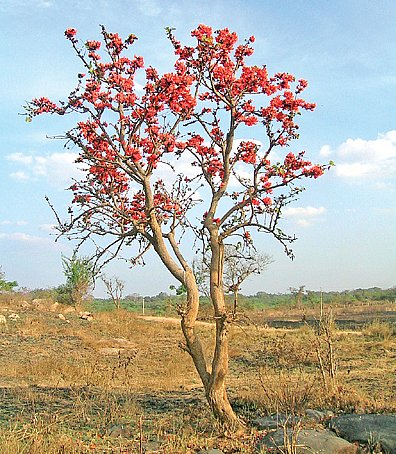Phuket Gardening – Thriving in stormy weather

PHUKET: Recently I enjoyed a visit to a Phuket spa with a South African couple who had come to live on the island. They pointed out that while many of the flowering shrubs are the same as in Cape Town or Johannesburg, they seem to be much less colorful in Phuket.
There are reasons for this relative dearth of blooming. As we all know, the rainy season has been unnaturally prolonged; consequently, there has been much less sunshine than normal. The surplus of precipitation has encouraged plants to grow more leaves than is usually the case, partly as a way of avoiding sodden root systems by increasing transpiration, but also to delay flowering and fruiting until the ripening sun returns. Many tropical shrubs will not bloom unless they receive their due ration of sunlight.
But there is another reason which has nothing to do with climatic aberration. It resides in Phuket’s tropical pattern of alternating hot, dry ‘winters’ with hot moist monsoons. The key word here is ‘hot”: the temperature here rarely drops below 25 degrees, and the nights are warm and humid. Plants used to Mediterranean, or even subtropical conditions will not readily tolerate year-round heat and humidity. They need a cool period when they can rest and recuperate.
Although the climate may hinder or prevent some trees from blooming in Phuket, Butea monosperma (thong-gwao in Thai) is perfectly at home and flourishes in both tropical and subtropical regions. It may be a bit large for the average garden, but as an Indian native – where it’s heralded as a harbinger of spring – it has the great advantage of being both drought and salt-resistant.
A deciduous and leguminous tree, it’s related to last week’s choice, the Brownea. Usually growing in a less than orderly way with a somewhat crooked trunk, it atones for this asymmetry by producing flaming orange red flowers which are borne on leafless branches in dense, short spikes, usually clustered in panicles. They put on a truly spectacular show of blossoms.
The large individual, beak-shaped flowers betray a clear resemblance to other members of the pea or bean family – to which the Butea or ‘flame of the forest’ belongs. This fact helps to explain its other common name of ‘parrot tree’. Predictably, its fruit are flattened, bean-like pods. The pinnate leaves, which consist of three leaflets, are large (10 to 20 cms) and leathery. They only appear after flowering.
Butea monosperma is a slow grower, so it won’t take over your garden, and will tolerate some pruning. Although it’s not easy to find here in garden centers, it’s a great choice if you can track one down. If a friend has a tree, try propagating Butea from seed.
The Butea has a peculiar way of handling mosquitoes. The female, attracted by the color and smell, lays her eggs in the water that collects in the center of the flower. Yet, happily, the eggs never hatch.
Phuket gardening tip of the week
At last the rains seem to have relented – at least for time being. The garden is lush and green, but some plants definitely haven’t enjoyed the deluge. Adenium, for example, are desert plants that enjoy dry conditions. For that reason they are an excellent choice for containers where, in theory, moisture levels can be managed.
Sadly, some of mine got too much water, and the result is root rot and spongy stems that suggest an imminent demise. In such rainy conditions, it is better not to hand-water at all, unless the plant is showing evident signs of distress.
Plumeria are also liable to fall foul of the over-moist conditions, as are Euphorbias and potted cacti.
On the other hand, plants that can’t get too much water are thriving. Canna lilies, the ginger brigade, Sambucus (southern elder) and Heliconia are all reveling in the current soggy conditions.
Phuket Gardening is Phuket Gazette columnist Patrick Campbell’s feature of all things flora.
If you have a garden that you would like featured on this page, please email Patrick by clicking here.
Keep checking our online Phuket Lifestyle pages for regular gardening features and tips.
— Patrick Campbell
Latest Thailand News
Follow The Thaiger on Google News:


























